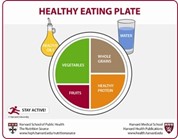Carbohydrates are often the center of much controversy, especially with the rise of recent low-carb fad diets. From avoiding sugars to the more recent trend of avoiding gluten-containing foods, people tend to target carbohydrates first when limiting foods in their diet. But are carbohydrates so bad? And how can they fit into a healthy diet?
What are carbohydrates?
Carbohydrates are one of the three main macronutrients that provide energy for the body (the others being fat and protein). The term carbohydrate is an umbrella term including simple sugars like glucose, lactose, or sucrose (also known as table sugar) and complex carbohydrates like fiber or starch.
When we eat carbohydrates, they are broken down in the gut into their simplest form, and then absorbed into the blood (think blood sugar!) to be stored or used for energy. Our bodies prefer sugar as its source of fuel, and our brains are especially reliant on it. The brain is fueled almost entirely by these sugars and only uses other energy forms in times of starvation1. The body can use protein and fat for fuel as well, but this process is not as quick or efficient. So, if our bodies want sugar badly, why does it get a bad rap?
What are low carb diets? Do they work?
Low carb diets, such as the keto diet, Atkins diet, Paleo diet, and many others, encourage some form of carbohydrate restriction with the promise of weight loss. However, these diets are unlikely to support sustained weight loss over time2. Some of these diets do have uses for other conditions. For example, a keto diet is used in treating children with epilepsy3 and the Paleo diet may have some applications in treating autoimmune diseases4. It is also worth noting that, when using the keto diet to treat epilepsy, the patient is strictly monitored in a hospital setting when going through this treatment. This is a potentially dangerous transition and should not be taken lightly. Most people on fad diet version of the keto diet do not reach a state of true ketosis, despite what many people think.
Some people do see some weight loss when initially starting a low carb diet. This is part of the attraction to these low carb diets: that you see “results” quickly. However, this initial weight loss is not actually true fat loss but is due to water loss. When carbohydrates are stored in the body, they are stored in a form called glycogen, which attracts water. When these glycogen stores are diminished in a low carb diet, the water that is typically stored with glycogen is lost, and people see that quick initial weight loss. However, once carbs are re-introduced back into the diet, the water will return.
Diets in general cause you to pay more attention to what and how much you are eating and the exercise that you are getting. Food restrictions can help to establish a calorie deficit; however, this may not be sustainable. Strict food restrictions lead people to crave and fixate on those forbidden foods. This is a natural response to food restrictions and is often more apparent when we limit carbohydrates. As mentioned earlier, carbohydrates are the body’s preferred source of fuel. So, when the body is not getting the fuel that it wants, it can try to get you to eat carbohydrates by increasing sugar or sweet cravings. These cravings ultimately result in splurging or overeating those forbidden foods, which may bring feelings of stress or guilt. This tends to cause people to think they can’t trust themselves around certain foods, and therefore must restrict those foods once again. If you have every felt this way, this is not due to “low self-control”, as many people chalk it up to be. This is the body’s natural response to food deprivation, which is why we call this the restrict-and-binge cycle5. In short, those who decide to take part in strict diets may have higher stress or guilt surrounding food, have more cravings, and may not achieve the weight loss they are aiming for.
Lastly, when carbohydrates are restricted, those foods are typically replaced with high protein or high fat foods. This typically means replacing plant foods, which tend to contain carbohydrates, for animal products like meat and dairy. These foods tend to be high in saturated fat, which can be harmful to our bodies in many ways. A diet high in saturated fat increases the risk of high cholesterol, heart disease, insulin resistance, and can increase inflammation in the body6,7. On the other hand, many nutritious and healthful plant foods like fruits, vegetables, whole grains, beans, and legumes, are rich in carbohydrates. Evidence has repeatedly shown that eating patterns high in plant foods such as these are associated with reduced risk of heart disease, diabetes, cancer, better weight management, and longer life expectancy8. When carbohydrates are restricted, people are missing out on the health benefits of these plant foods.
All in all, low carb diets are not typically sustainable or necessarily healthy. So now that we know we should be incorporating carbohydrates into our diets, how much should we be getting? And does the type of carbohydrate matter?
What is the best approach to carbs?
As discussed so far, low carbohydrate diets tend to be unsustainable and restrict many nutritious plant foods. So, how much carbohydrates do we need? A moderate carbohydrate diet, meaning getting about 45-65% of total calories from carbohydrates is recommended by the Dietary Guidelines for Americans. This has been found to be most beneficial to promote health and weight maintenance9. For a person on a 2,000-calorie diet, that is 225-325 grams of carbohydrates each day.
Not all carbohydrates are created equally. High consumption of carbohydrates that are highly processed or refined tend to spike blood sugar, cause inflammation, insulin resistance, and can contribute to weight gain10. Refined carbohydrates can also pass through our stomach quickly, meaning they don’t keep us full for long and can therefore contribute to weight gain. Refined carbohydrates in liquid form, such as sugary drinks like sodas, juices, and sweet teas, can pass through our gut more quickly than food can. Sugary beverages also tend to have little nutritional value beyond calories, so it is advised to limit sugary beverages. It is recommended to focus on whole plant foods, such as fruits, vegetables, whole grains, beans, and legumes as sources of carbohydrates while limiting foods that are higher in added sugar or refined grains.

In conclusion, incorporating carbohydrates in moderation with a focus on whole plant foods is the recommended approach to incorporating carbohydrates in the diet. Focusing on including a variety of colors on your plate will also help you get all the different phytonutrients (plant nutrients) that are common in carbohydrate-containing plant foods. Balancing carbohydrates with protein and fat, as seen in the USDA MyPlate or Harvard Healthy Plate, will ensure you are getting a well-rounded and balanced diet. Pairing this dietary pattern with drinking adequate water and incorporating exercise you enjoy is the best way to promote health and achieve a healthy weight.
If you are diagnosed with diabetes and would like more support on carbohydrates, Avance Care offers a free, monthly support group for people living with diabetes and their caregivers. Whether you are newly diagnosed or have been living with diabetes for many years, this group can help you with your diabetes management. Topics include healthy eating tips, stress management, preventing diabetes-related complications and more. Join the support group email list by calling 919-237-1337, option 4 or fill out the interest form below and someone will be in touch soon to get you started.
Avance Care Support Group Interest Form
References
- Mergenthaler P, Lindauer U, Dienel GA, Meisel A. (2013). Sugar for the brain: the role of glucose in physiological and pathological brain function. Trends Neurosci.
- Mahdi, GS. (2006). The Atkin’s diet controversy. Ann Saudi Med.
- Kossoff, E. (2017). Ketogenic Diet. Retrieved from https://www.epilepsy.com/treatment/dietary-therapies/ketogenic-diet
- Wahls, TL. (2017). The Wahls Protocol: How I beat progressive MS using Paleo principles and functional medicine. Vermilion.
- Hartley, R. (2017). Understanding the Restrict-Binge Cycle: the Dieting Pendulum. Retrieved from https://www.rachaelhartleynutrition.com/blog/2017/03/the-dieting-pendulum
- Hooper, L, Martin, N, Jimoh, OF, Kirk, C, Foster, E, Abdelhamid, AS. (2020). Reduction in saturated fat intake for cardiovascular disease. Cochrane Database Syst Rev.
- Von Frankenberg, AD, Marina, A, Song X, Callahan, HS, Kratz, M, Utzxchneider, KM. (2017). A high-fat, high saturated fat diet decreases insulin sensitivity without changing intra-abdominal fat in weight-stable overweight and obese adults. Eur J Nutr.
- Kahleova, H., Levin, S., & Barnard, N. D. (2020). Plant-based diets for healthy aging. J. Am. Coll. Nutr.
- USDA. (2020). Dietary Guidelines for Americans. Retrieved from https://www.dietaryguidelines.gov/sites/default/files/2020-12/Dietary_Guidelines_for_Americans_2020-2025.pdf
- Clemente-Suárez, VJ, Mielgo-Ayuso, J, Martín-Rodríguez, A, Ramos-Campo, DJ, Redondo-Flórez, L, Tornero-Aguilera, JF. (2022). The Burden of Carbohydrates in Health and Disease. Nutrients.

